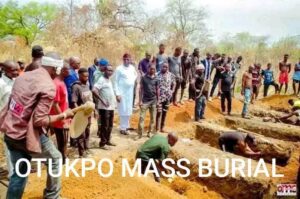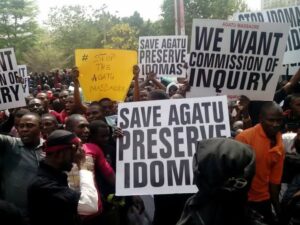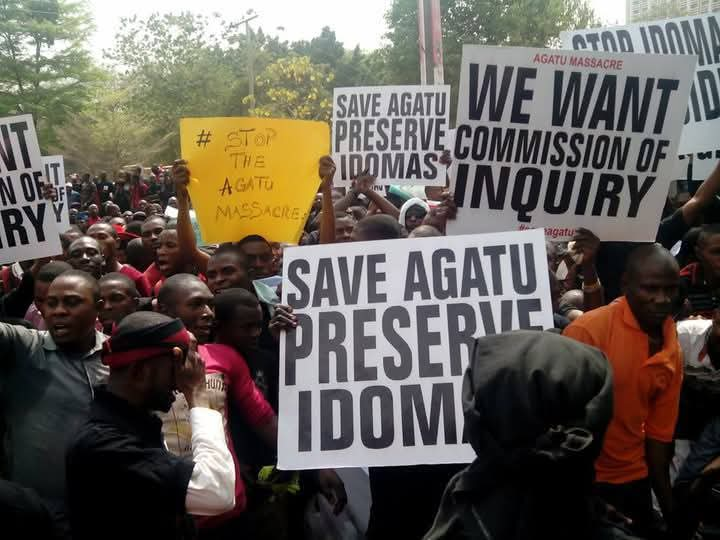The so-called reconciliation initiative between Fulani herdsmen and Apa/Agatu communities, championed by Agatu LGA Chairman James Melvin Ejeh under Governor Hyacinth Alia’s directive, has spectacularly failed. Instead of fostering peace, it has accelerated an outright occupation. The supposed conditions for resettlement—unarmed return, designated grazing areas, and a phased process—were disregarded from the start. Now, Apa is under siege, its villages reduced to ghost towns while the Fulani move in without restraint.
Apart from Ugbokpo, Oiji, Ikobi, and Ugbobi, nearly all other communities have been overrun. In Odugbo and Edikwu, herdsmen operate in shifts—some grazing cattle by night, while others patrol the villages during the day. Residents, trapped in fear, now consider each sunrise a miracle. Farming has become impossible, and locals are forced into silent submission, their ancestral lands slipping away under a government-endorsed encroachment.
A Government that Aids the Oppressor
Governor Alia’s so-called peace initiative was never about genuine reconciliation—it was a calculated move to normalize Fulani resettlement under the guise of diplomacy. His administration’s indifference to the suffering of the Apa and Agatu people has made it clear where its priorities lie. The Anti-Open Grazing Law, once a shield for Benue communities, is now treated as a mere formality, discarded whenever politically convenient. The government, rather than standing by its people, has facilitated their slow displacement.
It is no coincidence that Apa was chosen as the testing ground for this so-called reconciliation. Was it because its people are perceived as too weak to resist? Was it an intentional effort to fracture the community’s will before expanding this scheme to other parts of Benue? The silence from the state government speaks volumes—it is not an oversight; it is complicity.
Ojotu Ojema’s Deafening Silence: Betrayal or Complacency?
While Apa and Agatu burn, their political representatives remain eerily silent. Particularly alarming is the inaction of Ojotu Ojema, the supposed voice of the people in the National Assembly. Where is his outrage? Where is his resistance? His constituents have been abandoned, left to face this orchestrated takeover alone. Is he so entangled in political survival that he cannot muster the courage to defend his people?
“This silence is a betrayal,” says a local activist, who requested anonymity for security reasons. “When leaders refuse to speak out, they are as guilty as those enabling these atrocities.”
This is not the time for neutrality. The people of Apa and Agatu deserve more than a representative who watches from a distance as their homes are seized and their lands occupied. His failure to challenge this betrayal is an insult to those who elected him.
Peace Accord or Green Light for Occupation?
The recent massacre in Okpamaju, Otukpo LGA, lays bare the hypocrisy of this so-called peace accord. If reconciliation had truly been achieved, why are people still being slaughtered? The killers walk free, emboldened by a government too weak—or too complicit—to stop them.
The Idoma diaspora, in a statement signed by its spokesperson, condemned the situation, warning that “what is happening in Apa is a clear strategy of displacement under the pretext of peace.” The group has called for urgent intervention, accusing the state government of failing in its duty to protect lives and property.
It is no longer a question of whether Apa is under attack—it is a question of how much longer its people can endure before they are erased altogether. Human rights activist John Ochai argues that “this is not peace; this is a slow-motion conquest.”
The harsh truth is this: the so-called peace accord was never about peace. “This is a well-scripted strategy to establish Fulani control over Apa,” warns a security expert who has been monitoring the situation. “If urgent action is not taken, this could set the stage for a broader takeover.”
The question now is whether the people will accept their fate—or rise against the forces determined to erase them.
Written by Morgan Adikwu
